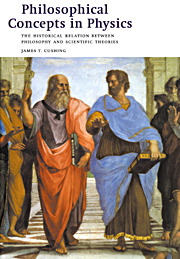 Philosophical Concepts in Physics
Philosophical Concepts in Physics Book contents
- Frontmatter
- Contents
- Preface
- Copyright acknowledgments
- PART I The scientific enterprise
- PART II Ancient and modern models of the universe
- PART III The Newtonian universe
- PART IV A perspective
- PART V Mechanical versus electrodynamical world views
- PART VI The theory of relativity
- 16 The background to and essentials of special relativity
- 17 Further logical consequences of Einstein's postulates
- 18 General relativity and the expanding universe
- PART VII The quantum world and the completeness of quantum mechanics
- PART VIII Some philosophical lessons from quantum mechanics
- PART IX A retrospective
- Notes
- General references
- Bibliography
- Author index
- Subject index
16 - The background to and essentials of special relativity
Published online by Cambridge University Press: 05 June 2012
- Frontmatter
- Contents
- Preface
- Copyright acknowledgments
- PART I The scientific enterprise
- PART II Ancient and modern models of the universe
- PART III The Newtonian universe
- PART IV A perspective
- PART V Mechanical versus electrodynamical world views
- PART VI The theory of relativity
- 16 The background to and essentials of special relativity
- 17 Further logical consequences of Einstein's postulates
- 18 General relativity and the expanding universe
- PART VII The quantum world and the completeness of quantum mechanics
- PART VIII Some philosophical lessons from quantum mechanics
- PART IX A retrospective
- Notes
- General references
- Bibliography
- Author index
- Subject index
Summary
In the popular mind Albert Einstein is identified as the architect of the theory of relativity and as the embodiment of modern scientific genius. Also, among a somewhat older set, he is probably remembered as a man with great humanitarian concerns, as well as the person whose theoretical work was the foundation for the atomic bomb. For one who was to become a singular legend even in his own lifetime, Einstein's background and early years were inauspicious enough. In fact, in later life his own assessment of his ability was that ‘I have no particular talent, I am merely extremely inquisitive.’ Like Newton, he seems to have had an exceptional power of concentration. We begin with a sketch of Einstein the man and then turn to his arguments for the relativity principle.
ALBERT EINSTEIN
Einstein was born in Ulm, Germany, into a family none of whose members had shown any brilliance. One year after Albert's birth, the family moved to Munich. His father ran a series of small businesses, most of which ended in failure. Young Albert was not a particularly good pupil, largely because he disliked the rigid German school system that placed great emphasis on learning by rote. He attended a Catholic elementary school, where he was the only Jewish student in the class, and then entered the Luitpold Gymnasium in Munich when he was ten.
- Type
- Chapter
- Information
- Philosophical Concepts in PhysicsThe Historical Relation between Philosophy and Scientific Theories, pp. 225 - 240Publisher: Cambridge University PressPrint publication year: 1998
